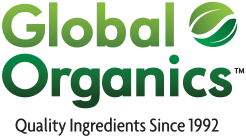Organic Coconut Nectar - Pure from the Source
06.19.2020 | Author: Global Organics | Category: Cane Sugar & Sweeteners, Coconut, Organic & Sustainability
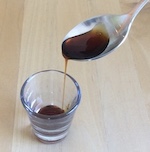 Organic and non-artificial sweeteners are steadily gaining popularity as ingredients in prepared foods. These include liquid sweeteners such as honey, maple syrup, rice syrup, agave nectar and last but not least...coconut nectar. Coconut nectar has a sweet, mild caramel flavor with an essence of floral, not at all coconutty. The organic coconut nectar from our supply partner is incredibly pure and has a sustainability story that goes above and beyond the average coconut nectar producer. Here’s the story.
Organic and non-artificial sweeteners are steadily gaining popularity as ingredients in prepared foods. These include liquid sweeteners such as honey, maple syrup, rice syrup, agave nectar and last but not least...coconut nectar. Coconut nectar has a sweet, mild caramel flavor with an essence of floral, not at all coconutty. The organic coconut nectar from our supply partner is incredibly pure and has a sustainability story that goes above and beyond the average coconut nectar producer. Here’s the story.
Benefits of Global Organics’ Coconut Nectar
Our coconut nectar is harvested in a single origin and produced by an exclusive supply partner. Single origin is important because multi-origin sources have a greater risk of contamination, adulteration and mistreatment of farmers.
Our supply partner collects the nectar or sap from their organic certified grower members, processes it and exports to our warehouses. They can ensure 100% transparency and traceability every step of the way. Often, coconut nectar and sugar pass through many hands between the farms and the exporter, leaving room for supply chain fraud. Unscrupulous farming groups have been known to mix certified organic with conventional sources (or conventional cane sugar) to increase capacity. Our nectar is 100% pure coconut nectar; the majority of organic coconut nectar on the market is made from reconstituted coconut sugar, which is then often refined.
In terms of attributes sought by consumers, our nectar is minimally processed, vegan, non-GMO, and comes from well-treated, valued farmers. It has a low glycemic index and is a source of vitamins, minerals and antioxidants not found in common sweeteners.
The Source
Our coconut nectar comes from the island of Java in Indonesia. The nectar comes from the blossoms of the coconut palm tree (Cocos nucifera L). The trees on our partner’s farms grow to be 35-60 feet tall. The average coconut palm lives to be 70-120 years old, with full productivity for 25-45 years. They start producing fruit after six years of growth. A blossom is also called an inflorescence which is a cluster of flowers on a stem. A single tree has 3-4 blossoms at a time. Some are tapped for nectar and others are left to fully flower and form coconuts.

Coconut palm trees are not to be mistaken for the source of palm oil which is a different type of tree (Elaeis quineensis L.) The coconut palm is a native species to Indonesia. It requires minimal inputs for optimal growth. It does not require irrigation and grows well among other trees and plants growing in the upper canopy and understory of the rainforest (banana, mango, jackfruit, limes).
Harvesting Coconut Nectar
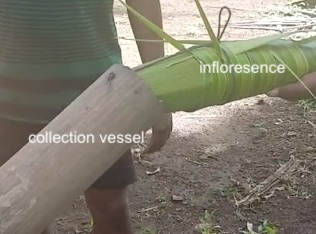 Our partner’s growers use a century-old Javanese hand-harvesting method. The process begins with a climber who goes up to the crown of the coconut palm tree and wraps the blossom with a palm leaf to keep it from becoming a fully opened flower. Then the climber masterfully cuts razor thin slices in the inflorescence to let the nectar flow. The nectar is collected twice daily in a steam sanitized bamboo vessel for several hours during the day. On average a climber harvests 25-60 trees a day or 50–120 climbs! The same tapped inflorescence produces for approximately 1 month, producing 2-5 liters/day.
Our partner’s growers use a century-old Javanese hand-harvesting method. The process begins with a climber who goes up to the crown of the coconut palm tree and wraps the blossom with a palm leaf to keep it from becoming a fully opened flower. Then the climber masterfully cuts razor thin slices in the inflorescence to let the nectar flow. The nectar is collected twice daily in a steam sanitized bamboo vessel for several hours during the day. On average a climber harvests 25-60 trees a day or 50–120 climbs! The same tapped inflorescence produces for approximately 1 month, producing 2-5 liters/day.
The climber descends the tree with the vessels attached to his belt. The climber expertly balances the vessels to prevent spillage at the same time protecting fronds on the tree. The day’s harvest is then transported to cook houses on the farms. Organic rules are posted on the door of every member's farmhouse to remind them of what they have committed to as organic farmers and stewards of the land. The entire process of harvesting and processing is recorded and supervised by our partner’s farming manager
Processing
Our partner has over 10 years of experience in coconut nectar product development. In the processing facility, master craftsmen make small batches of nectar by taking fresh nectar and then evaporating water by heating to produce a syrup. Purity is inspected throughout the process. Minimal processing helps retain phytonutrients and essential minerals. Proprietary methodology and analysis ensure the integrity and quality from the coconut palm flower to the facility. The nectar is packaged in jerry cans, drums and IBC containers and stored until it is exported. The journey from Indonesia to the US takes 4-6 weeks.
The following certifications and quality standards are maintained for our coconut nectar:
- Certifications: USDA NOP organic, EU organic, ISO 22000:2018, Kosher, fair trade certification is in process
- Quality standards: cGMP & GFSI food safety standards, HACCP food system
Sustainability
 Our supply partner and their grower group members use farming methods that support permaculture. Permaculture is a well thought-out sustainable system that combines techniques that preserve and restore natural resources and human resources. Permaculture integrates ecology, agro-forestry, organic farming, landscape design, and architecture to create a sustainable way of living (Source: Bill Mollison). Our partner works closely with their member farmers to educate them on farming techniques that save water and land and reduce carbon emissions.
Our supply partner and their grower group members use farming methods that support permaculture. Permaculture is a well thought-out sustainable system that combines techniques that preserve and restore natural resources and human resources. Permaculture integrates ecology, agro-forestry, organic farming, landscape design, and architecture to create a sustainable way of living (Source: Bill Mollison). Our partner works closely with their member farmers to educate them on farming techniques that save water and land and reduce carbon emissions.
Coconut palms require no tilling, no irrigation, and no heavy fertilization. On conventional (non-organic) coconut farms, understory crops are treated with herbicides which are not permitted in organic certified agriculture.
Harvesting nectar, described earlier, is done in a sustainable way in which does not harm the tree. Additionally, trees are rested for about 2-4 months every year to keep them healthy. When a tree dies or is no longer productive it is replanted. At the end of a coconut palm’s life it provides quality wood for building or handicrafts.
Our supply partner’s processing facility uses efficient stove technologies that are approximately 30% more efficient than the standard stoves used in Indonesia. They also have a “no virgin timber” policy for both their farmers and their facility. They use waste biomass as a fuel source.
Several water conservation practices are followed including a new vessel cleaning practice that will reduce total water consumption by 75%. They have also implemented a new wastewater system that meets international standards. Wastewater will now be transported to local agroforests to fertigate trees.
All internal packaging is 100% reused to reduce internal waste. Export packaging is almost entirely recyclable or can be repurposed (the IBCS can be almost entirely refurbished and reused). The plastic wrap is LLDPE stretch film and can be recycled. Plastic pallets are able to be reused or recycled at end of life.
Just Treatment of Farmers
Our coconut nectar partner goes beyond the practices of many fair trade certifications. Their programs uplift farmers out of modern-day slavery. They can do this by keeping their farmer groups to a manageable size, so they can work closely with them and listen to their needs.
Unlike many processors, our supply partner has initiated several economic and social programs which benefit the coconut nectar farmers and their families:
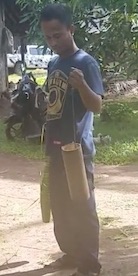
- Average farmers earn more than 300% the local government minimum wage. These rates are higher than fair trade rates. Most employers in the region don't even pay the government minimum. Coconut nectar farmers work directly with our supply partner, so there are no middlemen that taking a cut of the payment.
- A debt reduction program was launched where farmers benefit by getting their debts "refinanced." A partnership was made with a local group to reduce the farmers' interest rates to half, as well as to utilize a payment plan to ensure they are debt-free in about two years or less.
- Three wells were installed to provide free freshwater access. Before they had to walk over a kilometer on average, and for some even further.
- Health insurance for farmers and their families is in the works.
- Educational assistance programs were developed for the farmers’ children and free nutrition education programs for their wives.
- Continuing education programs for the farmers on advanced permaculture, animal husbandry, or on the basic skills of reading and writing.
So that's the incredible story of our coconut nectar. If you'd like to read why our partner started this project, read on.
Founding a Sustainable Coconut Company
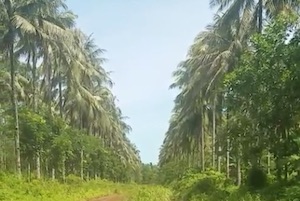 The founder of our coconut nectar supply company did not grow up with a coconut palm tree in his yard. He grew up in a cold region of the U.S. but was fortunate to travel to equatorial countries at an early age and spend the end of his high school year studying on a schooner. Coconut palm trees, coral reefs, tropical rainforests and water fascinated him. In college he studied plant ecology and sustainable agriculture. Studying ethnobotany in the upper Amazon he climbed high in giant tree canopies and worked with indigenous tribesman to survey medicinal rainforest species. He fell in love with the profound beauty of virgin rainforests and the traditional wisdom of the native culture.
The founder of our coconut nectar supply company did not grow up with a coconut palm tree in his yard. He grew up in a cold region of the U.S. but was fortunate to travel to equatorial countries at an early age and spend the end of his high school year studying on a schooner. Coconut palm trees, coral reefs, tropical rainforests and water fascinated him. In college he studied plant ecology and sustainable agriculture. Studying ethnobotany in the upper Amazon he climbed high in giant tree canopies and worked with indigenous tribesman to survey medicinal rainforest species. He fell in love with the profound beauty of virgin rainforests and the traditional wisdom of the native culture.
These early experiences led him to studying sustainable ways to solve water pollution problems. Post-college, he received a Fulbright scholarship to research a wastewater system in a fishing village in the Philippines. This village used to have pristine reefs and virgin tropical forests, however, when he arrived, he only saw heavily silted rivers and a bay that looked like chocolate milk. Witnessing the drastic, harmful environmental (cleared forests, dying reefs) and social impacts (poverty) that conventional farming caused deeply disturbed him.
After his research project ended, the owner of an organic cookie company (also his mother) asked him to stay in the Philippines and look into sourcing coconut sugar as an alternative sugar for her cookies. From 2009-2011 he traveled extensively throughout the Philippines and the Indonesian Archipelago studying and comparing different producers of coconut sugar. While working closely with various organic farming groups throughout Java he encountered many problems in the supply chain, mainly adulteration and corruption. To avoid the complexities of the coconut sugar industry he decided to create his own company where he had complete control of the supply chain.
With his own company he could now treat farmers fairly and pay them an equitable rate and virtually eliminate the chance of adulteration, corruption, and contamination. He also implemented his philosophy of pure permaculture. In 2015, he received organic certification for his grower group and processing facility.
His story doesn’t stop here. Now he is working on improving efficiencies throughout his entire process to ensure less waste, a lower carbon footprint, and making more of a positive impact. He is rolling out new stove technologies at the farm that will improve fuel consumption by about 25-35%. This is a modest savings, but it is just the first phase of his plan to reduce fuel usage significantly. His aim is to become a net carbon sink or “climate positive” by 2029.
He intends to conduct a life cycle analysis (LCA) of his entire process (harvest, production packaging, and transport). This will include a carbon analysis from harvest to delivery at his customers’ warehouses. He then plans to offset this through an extensive conservation and reforestation program in three areas, tropical coastal forest systems (mangroves and those essential to support reef systems), permaculture systems to diversify current food systems in Indonesia, and pristine tropical systems.
And finally, he will continue to produce the purest, organic coconut nectar as the foundation of all good food is quality ingredients.
To learn more about our organic coconut nectar and to request a sample, please contact your Global Organics account manager or email info@global-organics.com.
